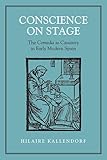Conscience on Stage : The Comedia as Casuistry in Early Modern Spain / Hilaire Kallendorf.
Material type: TextSeries: University of Toronto Romance SeriesPublisher: Toronto : University of Toronto Press, [2007]Copyright date: ©2007Description: 1 online resource (320 p.)Content type:
TextSeries: University of Toronto Romance SeriesPublisher: Toronto : University of Toronto Press, [2007]Copyright date: ©2007Description: 1 online resource (320 p.)Content type: - 9780802092298
- 9781442684218
- 862/.05230903
- PQ6105
- online - DeGruyter
| Item type | Current library | Call number | URL | Status | Notes | Barcode | |
|---|---|---|---|---|---|---|---|
 eBook
eBook
|
Biblioteca "Angelicum" Pont. Univ. S.Tommaso d'Aquino Nuvola online | online - DeGruyter (Browse shelf(Opens below)) | Online access | Not for loan (Accesso limitato) | Accesso per gli utenti autorizzati / Access for authorized users | (dgr)9781442684218 |
Browsing Biblioteca "Angelicum" Pont. Univ. S.Tommaso d'Aquino shelves, Shelving location: Nuvola online Close shelf browser (Hides shelf browser)

|

|

|

|

|

|

|
||
| online - DeGruyter Char Davies's Immersive Virtual Art and the Essence of Spatiality / | online - DeGruyter City Stages : Theatre and Urban Space in a Global City / | online - DeGruyter Complex Sovereignty : Reconstituting Political Authority in the Twenty-First Century / | online - DeGruyter Conscience on Stage : The Comedia as Casuistry in Early Modern Spain / | online - DeGruyter Craft Capitalism : Craftsworkers and Early Industrialization in Hamilton, Ontario / | online - DeGruyter Critical Realism and the Social Sciences : Heterodex Elaborations / | online - DeGruyter Dancing Around the Elephant : Creating a Prosperous Canada in an Era of American Dominance, 1957-1973 / |
restricted access online access with authorization star
http://purl.org/coar/access_right/c_16ec
It is no accident that some variation of the question 'What should I do?' appears in over three-quarters of the comedic plays of the Spanish Golden Age. Casuistical dialogue was a concern, even an obsession, of Spanish playwrights during the seventeenth century, many of whom were educated by Jesuit casuists. Conscience on Stage is a study of casuistry or case morality as the foundation for a poetics of seventeenth-century Spanish comedias.Hilaire Kallendorf examines the Jesuit upbringing and casuistical education of major playwrights of the Spanish Golden Age, many of whom were also priests, and introduces the vocabulary of casuistry, as expressed in both confessors' manuals and in stage plays. Engaging issues of class, gender, and age to explore scenes of advice-giving and receiving, she demonstrates how the culture-specific construct of 'conscience' in early modern Spain can be recovered by means of a Foucauldian genealogy, which enlists the skills of philology at the service of a larger vision of the history of ideas. This study outlines and reiterates the relationship of theatre to casuistry, the Jesuit contributions to Spanish literary theory and practice, and the importance of casuistry for the study of early modern subjectivity.
Mode of access: Internet via World Wide Web.
In English.
Description based on online resource; title from PDF title page (publisher's Web site, viewed 01. Nov 2023)


